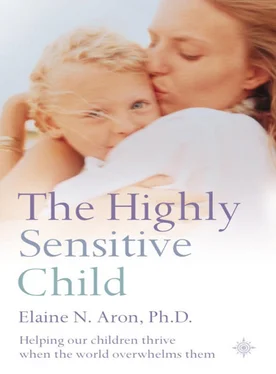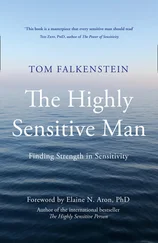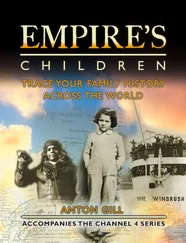This chapter helps you decide if you have a highly sensitive child and explores the trait thoroughly. It also provides more knowledge about all of your child’s inherited temperament traits. Our goal will be to free you of any misconceptions you may have heard about sensitive children. Finally, we will distinguish high sensitivity from actual disorders (which it is not ).
Well, if he were my child, he’d eat what was set before him.”
“Your daughter is so quiet—have you considered seeing a doctor about that?”
“He is so mature, so wise for his age. But he seems to think too much. Don’t you worry that he isn’t more happy and carefree?”
“Jodie’s feelings are so easily hurt. And she cries for other kids, too, when they are teased or hurt. And during the sad parts of stories. We don’t know what to do for her.”
“In my kindergarten class, everyone participates in group time, but your son refuses. Is he this stubborn at home?”
Are these sorts of comments familiar to you? They are to the parents I interviewed for this book. They had heard all sorts of well-intentioned comments like these from in-laws, teachers, other parents, and even mental health professionals. If you’ve received such comments, it is almost surely a sign that you are the parent of a highly sensitive child (HSC). And, of course, they are troubling, because you’re hearing that something is odd or wrong with your child, yet you find your child marvelously aware, caring, and sensitive . Furthermore, you know that if you followed the well-intentioned advice, like forcing your child to eat foods he dislikes, socialize when he does not feel like it, or taking him to a psychiatrist, your child would suffer. On the other hand, if you follow the lead of your child, he thrives. Yet the comments keep coming, so you wonder if you’re a bad parent and if your child’s behavior is your fault. I have heard this same story over and over.
THE OPERATING MANUAL FOR YOUR CHILD
No wonder you worry that you may be doing something wrong. You have no one to help you. You have probably noticed that most parenting books focus on “problem behaviors”—restlessness, distractibility, “wildness,” and aggression. Your child is probably anything but a problem in these senses. You’re struggling with issues that the books don’t talk about so much—eating problems, shyness, nightmares, worrying, and intense emotions that are not directed so much at others as they are simply outbursts. The usual advice that you eliminate unwanted behaviors through “consequences” (punishment) often does not work—your child seems crushed by punishment or even criticism.
In this book you will receive advice, but only for sensitive children and from parents of sensitive children, myself included, plus specialists in this trait. And our first advice is not to believe people when they imply there is something wrong with your child, and do not let your child believe it either. Nor are your child’s differences your fault. Of course parenting can always be improved, and this book will “improve” you more than others, because, again, it is written entirely with your “different” child in mind. But forget the idea that the problem is some basic flaw in parent or child.
“DISCOVERING” HIGH SENSITIVITY
According to my own scientific research and professional experience as well as that of many others who have studied this trait under different, less accurate labels, your child has a normal variation in innate human temperament. She is one of the 15 to 20 percent born highly sensitive—far too many for them all to be “abnormal.” Furthermore, the same percentage of sensitive individuals is found in every species that has been studied, as far as I know. With evolution behind it, there must be a good reason for the trait’s presence. We will get to that in a moment, but first, a little bit about this “discovery.”
I began studying high sensitivity in 1991, after another psychologist commented to me that I was highly sensitive. I was curious personally, not planning to write a book or even to try to tell anyone about my findings. In my community and the university where I was teaching, I merely asked to interview people who were “highly sensitive to physical or emotionally evocative stimuli” or “highly introverted.” At first I thought sensitivity might really be the same as introversion, which is the tendency to prefer to have one or two close friends with whom one can talk deeply, and not to be in large groups or meet strangers. Extroverts, on the other hand, like large gatherings, have many friends but usually talk less intimately with them, and enjoy meeting new people. It turned out that introversion was not the same as high sensitivity: Although 70 percent of highly sensitive people (HSP) are introverts, a tendency that is probably part of their strategy to reduce stimulation, 30 percent are extroverts. So I knew I had uncovered something new.
Why would a highly sensitive person be extroverted? According to my interviews, they were often raised in close, loving communities—in one case even a commune. For them, groups of people were familiar and meant safety. Others seemed to have been trained to be outgoing by their families—it was imperative, and as good HSPs they tried to do what was expected of them. One woman recalled the day and hour she decided to become an extrovert. She had lost her best and only friend and decided then and there not to depend anymore on having just one friend.
Since discovering that the trait of sensitivity is not the same as introversion, I have found other evidence that sensitive people are also not inherently shy or “neurotic”—that is, anxious and depressed. All of these descriptors are secondary, noninnate traits found in some sensitive people as well as in many who are not sensitive.
When I made my request to interview sensitive people, I was swamped with volunteers, and finally spoke individually with forty men and women of all ages and walks of life, for three hours each. They really wanted to talk about this—the term and why it meant so much to them the moment they heard it. (Many adults purchase The Highly Sensitive Person simply because they recognized themselves in the title, and likewise you may have bought this book because you recognized your child in its title.)
After discerning the many details of sensitivity from these interviews, I was able to create a long questionnaire about it, and later a shorter one (see pages 88–89), and have since given these to thousands of individuals. The 20 percent or so who are highly sensitive usually immediately grasp the concept as describing them. The non-sensitive 80 percent or so truly do not “get it” and some answer “no” to every item. I found the same results through a random phone survey. Sensitive people really are different.
Since then I have written and taught on the subject extensively, and soon saw the need for a book on raising highly sensitive children. There were too many sad stories from adults about their difficult childhoods, in which well-meaning parents caused tremendous pain because they did not know how to raise a sensitive child. So I interviewed parents and children, and from those talks developed a questionnaire that was given to over a hundred parents of all types of children. That survey, when honed down to the questions that best distinguish HSCs from non-HSCs, became the parent’s questionnaire at the end of the Introduction.
WHAT IS HIGH SENSITIVITY?
Highly sensitive individuals are those born with a tendency to notice more in their environment and deeply reflect on everything before acting, as compared to those who notice less and act quickly and impulsively. As a result, sensitive people, both children and adults, tend to be empathic, smart, intuitive, creative, careful, and conscientious (they are aware of the effects of a misdeed, and so are less likely to commit one). They are also more easily overwhelmed by “high volume” or large quantities of input arriving at once. They try to avoid this, and thus seem to be shy or timid or “party poopers.” When they cannot avoid overstimulation, they seem “easily upset” and “too sensitive.”
Читать дальше











